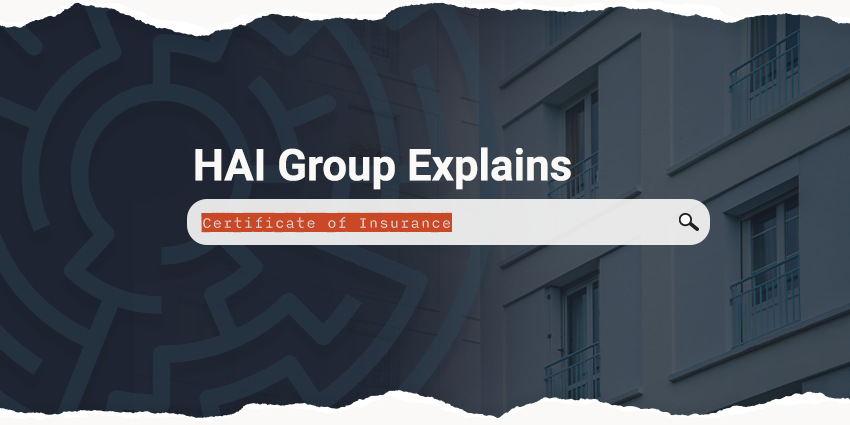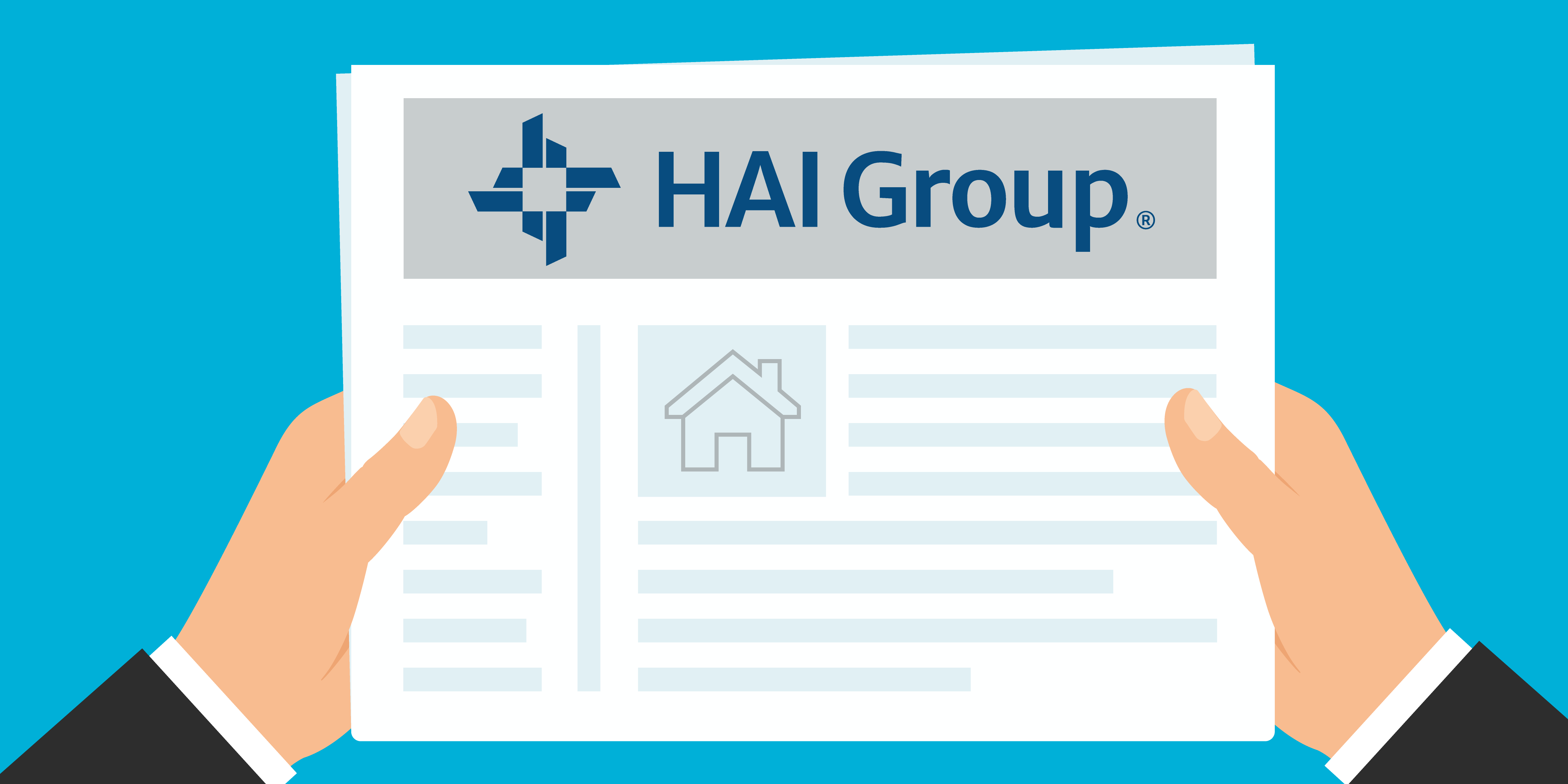In the realm of commercial insurance, certificates of insurance (COIs) play a crucial role in facilitating business transactions and safeguarding the interests of various stakeholders. These documents provide tangible proof of insurance coverage and valuable information about policy details, limits, and endorsements.
This article delves into the significance of COIs, their purpose, and when housing organizations will need them.
Understanding certificates of insurance
Brian Ziegenbalg, who works on HAI Group's Account Services team, said a certificate of insurance is a document issued by an insurance company or its authorized representative providing evidence that an insurance policy is in effect.
"It summarizes the policy's key aspects, including the coverage type and scope, policy limits, policy periods, and any applicable endorsements or exclusions," he said.
Ziegenbalg stressed that a certificate of insurance is not the insurance policy itself but rather a concise representation of its key elements.
Purpose of certificates of insurance
1. Proof of Coverage: A primary purpose of COIs is to provide evidence of insurance coverage.
"Businesses often need to demonstrate that they carry certain types and amounts of insurance to comply with contractual or regulatory requirements," Ziegenbalg said.
Clients, vendors, lenders, landlords, and other interested parties frequently request COIs to verify that a business is adequately insured before entering into agreements or transactions.
2. Risk Mitigation: COIs are critical in mitigating risk for all parties involved in a business relationship.
"By requesting and reviewing COIs, stakeholders can assess whether the other party has appropriate insurance coverage to respond to potential liabilities or claims," Ziegenbalg explained.
This process helps protect against financial losses and ensures that adequate resources are available in case of an unforeseen incident or lawsuit.
3. Liability Transfer: COIs also facilitate liability transfer.
For instance, a general contractor might require subcontractors to provide COIs to ensure they carry liability insurance covering their work, Ziegenbalg said.

In doing so, the contractor can transfer a portion of the liability exposure to the subcontractor, providing an added layer of protection.
"COIs help to clarify the responsibilities and liabilities of various parties involved in a project or business arrangement," he said.
4. Contractual Compliance: Many contracts, agreements, or leases stipulate specific insurance requirements.
For instance, a lease agreement may require a tenant to carry liability insurance naming the landlord as an additional insured party. By providing a COI, the tenant fulfills this contractual obligation and demonstrates compliance with the lease terms.
Ziegenbalg said COIs are a mechanism to ensure that all parties meet their insurance-related obligations within contractual relationships.
When certificates of insurance are typically required
1. Client or Customer Demands: In the housing industry, lenders and business partners often require proof of insurance before engaging in business transactions.
"Lenders and business partners want assurance that the organization they are dealing with has the necessary coverage to address potential liabilities or claims," Ziegenbalg noted.
COIs provide a quick and convenient way to validate insurance coverage, instilling confidence in the organization's ability to fulfill its contractual obligations.
2. Regulatory Compliance: Certain industries are subject to strict insurance regulations. For instance, transportation companies, healthcare providers, and contractors often require specific types and levels of insurance coverage to comply with state, federal, or industry-specific regulations.
COIs serve as tangible evidence of compliance with these regulations, enabling businesses to operate legally and avoid potential penalties.
3. Risk Management: Housing organizations should recognize the importance of risk management and strive to protect their assets and financial well-being.
"By requesting COIs from vendors, contractors, or other third parties, organizations can assess the potential risks associated with their operations," Ziegenbalg explained. "They can ensure that their business partners have appropriate coverage, reducing the chances of liability exposures or financial losses resulting from inadequate insurance."
Ziegenbalg says housing organizations should always require that outside vendors provide a certificate of insurance.
"If an organization is planning an event, we also ask them to run the idea by their insurance representative first to ensure they're putting the right pieces in place to mitigate risk," he added.
One such piece is event liability insurance, a short-term policy that protects your organization from any claims resulting from property damage or injuries during a covered event.
4. Additional Insured Status: COIs may include an "Additional Insured" provision, which extends coverage under an existing policy to a third party.
"This provision is particularly relevant in construction, where property owners or contractors often request to be named as additional insureds on subcontractors' policies," Ziegenbalg said. "Being listed as an additional insured provides an added layer of protection in case of a claim arising from the subcontractor's work."
In a recent example, a housing organization received a grant from the city to help renovate properties. Ziegenbalg said the city required that the housing organization provide a certificate of insurance and add the city as an additional insured on the policy.
"This is a common scenario in the public and affordable housing industry," he said.
Bottom Line: Certificates of insurance are critical for public and affordable housing organizations
COIs are valuable tools in commercial insurance that serve multiple purposes. They provide proof of coverage, facilitate risk mitigation, enable liability transfer, and ensure contractual compliance. Insured individuals and organizations require COIs to meet client demands, comply with regulations, manage risk, and secure additional insured status.
"By understanding the significance of COIs, housing organizations can navigate the complexities of insurance more effectively, foster trust in business relationships, and protect themselves from potential financial liabilities," Ziegenbalg said.
Do you have more questions on COIs, or do you need to request a certificate of insurance? Contact your HAI Group account executive today.
This article is for general information only. HAI Group makes no representation or warranty about the accuracy or applicability of this information for any particular use or circumstance. Your use of this information is at your own discretion and risk. HAI Group and any author or contributor identified herein assume no responsibility for your use of this information. You should consult with your attorney or subject matter advisor before adopting any risk management strategy or policy.






